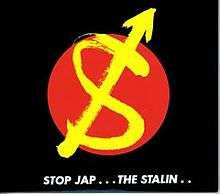Stop Jap
Stop Jap is the second album by Japanese hardcore punk band The Stalin, released on July 1, 1982.[1] In September 2007, Rolling Stone Japan rated Stop Jap #27 on their list of the 100 greatest Japanese rock albums of all time.[2] It was named number 22 on Bounce's 2009 list of 54 Standard Japanese Rock Albums.[3]
| Stop Jap | ||||
|---|---|---|---|---|
 | ||||
| Studio album by | ||||
| Released | 1 July 1982 | |||
| Recorded | 5 – 12 March 18 – 2 March, 3 May 1982 | |||
| Studio | Rockwell Studio, Hakone Sunrise Studio, Tokyo | |||
| Genre | Punk, hardcore punk | |||
| Length | 34:19 | |||
| Label | Tokuma Onkou | |||
| Producer | Mikio Moriwaki | |||
| The Stalin chronology | ||||
| ||||
The first pressing contained a lyric sheet for "Meat" and was pressed on red vinyl. An additional cover of The Doors' "Light My Fire" and The Stooges' song "No Fun" was available on the cassette version that had been released at the same time.
Stop Jap was The Stalin's second full-length album. It was, contrary to the album Trash, easy to purchase right from the start. This was due to the efforts of Tokuma Onkou, the new record label The Stalin signed to. Some of the tracks on the album are old tracks with different titles and adapted lyrics.
Track listing
All lyrics are written by Michiro Endo; all music is composed by The Stalin, except where noted.
| No. | Title | Length |
|---|---|---|
| 1. | "Romantist" (ロマンチスト Romanchisuto) | 2:09 |
| 2. | "Stop Jap" | 1:50 |
| 3. | "Gokuraku Tonbo" (極楽トンボ, Happy-Go-Lucky) | 0:45 |
| 4. | "Tama Negi Hatake" (玉ネギ畑, Onion Field) | 2:25 |
| 5. | "Sōsēji no Medama" (ソーセージの目玉, Eyeballs of Sausage) | 1:15 |
| 6. | "Gesuidō no Petenshi" (下水道のペテン師, Swindler in the Sewer) | 1:54 |
| 7. | "Allergy α" (アレルギーα Arerugī α) | 0:53 |
| 8. | "Yokujō" (欲情, Lust) | 1:43 |
| 9. | "Money" | 3:23 |
| No. | Title | Length |
|---|---|---|
| 1. | "Stop Girl" | 3:56 |
| 2. | "Burst Head" ( | 2:39 |
| 3. | "Miser" | 2:42 |
| 4. | "Makeinu" (負け犬, Loser) | 2:03 |
| 5. | "Allergy β" (アレルギーβ Arerugī β) | 0:53 |
| 6. | "Warushawa no Gensō" (ワルシャワの幻想, Fantasy in Warsaw) | 5:30 |
| No. | Title | Lyrics | Music | Length |
|---|---|---|---|---|
| 16. | "Light My Fire" (from single "Romantist") | John Densmore, Ray Manzarek, Jim Morrison, Endo | Densmore, Manzarek, Morrison | 1:58 |
| 17. | "Allergy" (アレルギー Arerugī) (single version) | 0:54 | ||
| 18. | "No Fun" (from single "Allergy") | Iggy Pop, Scott Asheton, Dave Alexander, Ron Asheton, Endo | Pop, S. Asheton, Alexander, R. Asheton | 3:00 |
| 19. | "Warushawa no Gensō" (ワルシャワの幻想, Fantasy in Warsaw) (Unpublished live version) (Recorded at Hibiya Open-Air Concert Hall 1982.5.8) | 6:02 | ||
| 20. | "Artist" (アーチスト Āchisuto) (Unpublished live version) (Recorded at Hibiya Open-Air Concert Hall 1982.5.8) | 3:49 |
Credits
Band Members
- Michiro Endo - vocals
- Kazuo "Tam" Tamura - guitar
- Shintaro Sugiyama - bass
- Jun Inui - drums
Staff/Crew
- Mikio Moriwaki- Producer
- Masafumi Kato- Director
References
- "Stop Jap". discogs.com. Retrieved 2011-07-31.
- "English translation and summary of the Rolling Stone Japan article". neojaponisme.com. Retrieved 2011-12-10.
- "日本のロック・スタンダード・アルバム54(5)". Tower Records. 2009-06-03. Retrieved 2018-02-20.